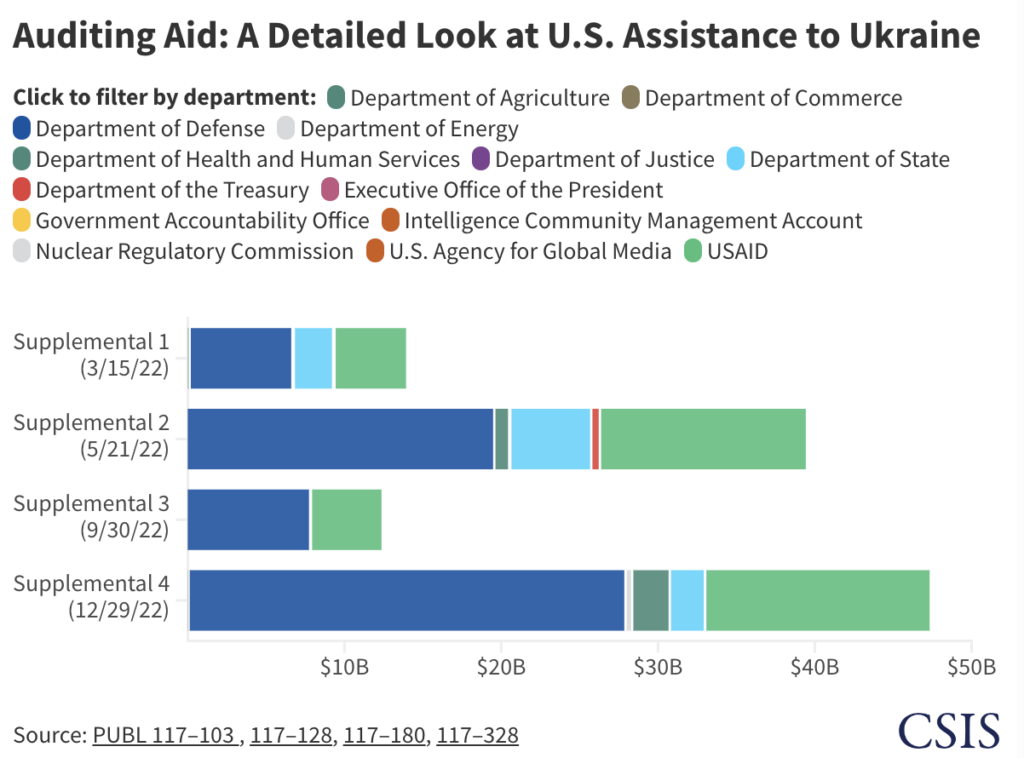Nearly two years ago, mere months after Russia’s invasion of Ukraine, the House of Representatives approved its second package of economic, humanitarian, and military funding for Ukraine. The $40 billion measure passed May 10, 2022, by an overwhelming margin of 368-57.
At the time, those 57 lawmakers voting against the bill represented a cohort of Republicans who were already skeptical of the U.S. strategy for the Russia-Ukraine conflict and frustrated by the lack of debate in Congress and oversight of taxpayer money.
Today, that number has doubled. There are now more Republicans in the House opposed to additional Ukraine funding than those who support it.
Even so, the latest Ukraine funding bill—totaling $60 billion—was approved Saturday with a 311-112 vote with the unanimous support of Democrats. All 112 lawmakers voting against the bill were Republicans. By comparison, 101 Republicans voted in favor of the bill.
Speaker Mike Johnson, R-La., who voted against the $40 billion Ukraine bill in May 2022, was a notable exception. He championed the Ukraine measure Saturday as part of a four-bill foreign aid package that totals $95 billion.
“I’d rather send bullets to Ukraine than American boys,” Johnson told Newsmax. “We don’t want to have boots on the ground, and we can prevent that by allowing them to hold Putin at bay.”
In addition to the Ukraine funding ($60.84 billion), lawmakers also approved separate bills for Israel ($26.38 billion); the Indo-Pacific ($8.12 billion); and the 21st Century Peace Through Strength Act, a bill that would impose more sanctions on China, Iran, and Russia. They also adopted a measure requiring TikTok’s parent company to sever ties with the Communist Chinese government or cease operations within the United States.
With the full package of bills expected to pass the Senate in the coming days, it will mark the fifth time Congress has approved funding to help Ukraine.
Saturday’s vote, however, was the first by a Republican-led House. The four previous measures were adopted in 2022 when Democrats led the chamber and Speaker Nancy Pelosi, D-Calif., was calling the shots.
The previous four funding bills provided a total of approximately $113 billion to Ukraine, averaging about $900 per American household. The number could really be as high as $125 billion, according to information Sen. JD Vance, R-Ohio, and other lawmakers obtained from the White House’s Office of Management and Budget.
Once the new $60 billion is added to the total, taxpayers will be on the hook for more foreign aid to Ukraine at a time when they are struggling to afford gas, groceries, and rent.

Republicans objecting to the latest Ukraine funding bill cited a variety of reasons for their opposition, although a dominant theme had to do with the failure to secure any meaningful changes to President Joe Biden’s handling of the U.S. border crisis and instead making foreign aid a higher priority.
But other questions remain about Ukraine and its notorious reputation for corruption.
Writing for The Hill last week, Heritage Foundation President Dr. Kevin Roberts noted that concerns conservatives began raising two years ago are now proving correct, including a failure to track military weapons supplied to Ukraine and embarrassing Pentagon accounting errors.
“Ukraine’s minister of defense was fired for questions around military graft. Billions in U.S. aid have flowed to economic aid rather than lethal weapons,” Roberts wrote. “More importantly, then as now, President Biden has presented no coherent strategy or plan for victory or peace in Ukraine to the American people, who are gradually losing patience with the bloody stalemate his administration has created.”
Two years ago, when the $40 billion foreign aid bill reached the Senate, 11 Republican senators voted against the Ukraine measure. This time, the foreign aid package will include money for Ukraine, Israel, the Indo-Pacific, and other legislation included by the House, so determining if there will be a similar result to the House vote might be difficult to assess.
Still, the evolving outlook toward Ukraine reflects a changing mindset among conservatives about U.S. foreign policy. The implications of continuing to fund a foreign war, particularly in times of economic strain at home, will no doubt continue to animate conservatives and divide Republican lawmakers.

